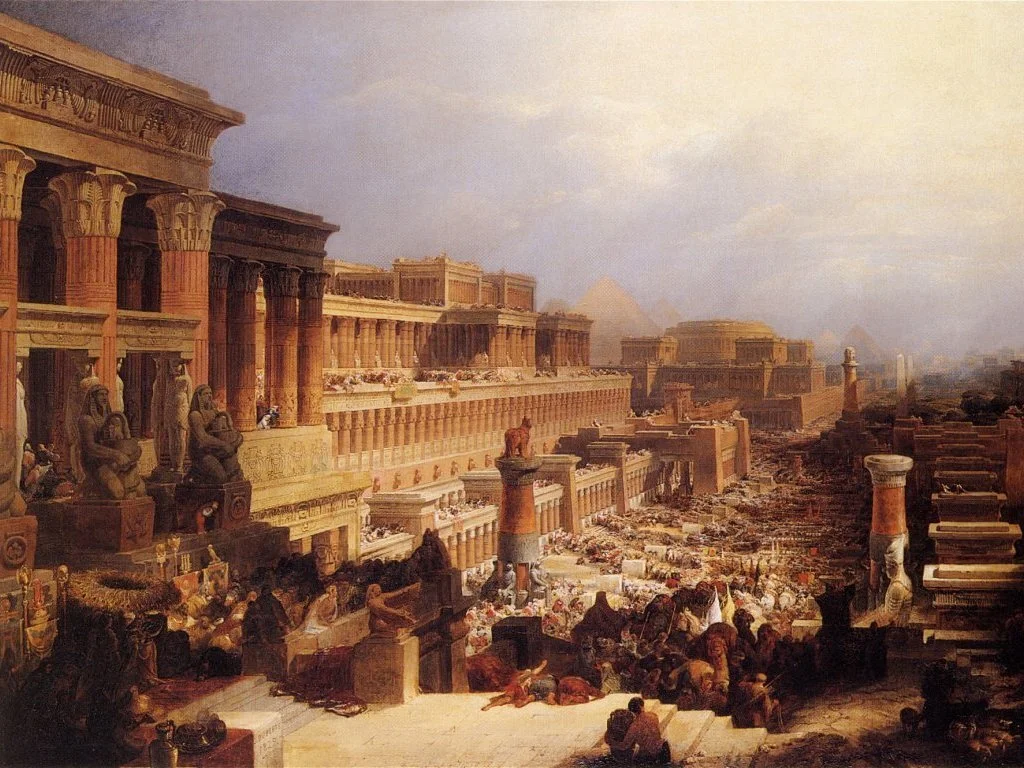Author: David Wilber
The expression “law of Christ” appears only two times in the New Testament. In Galatians 6:2, Paul urges his readers to fulfill “the law of Christ” (τὸν νόμον τοῦ Χριστοῦ). Similarly, in 1 Corinthians 9:21, Paul states that he is “under/in the law of Christ” (ἔννομος Χριστοῦ). Traditionally, interpreters have frequently understood this expression to refer to a new “law” or ethic that supersedes the law of Moses. However, as Todd Wilson notes, there is a “growing scholarly consensus” that “law of Christ” directly refers to the law of Moses in some sense.[1] This article makes a case for interpreting the phrase “law of Christ” in Galatians 6:2 and 1 Corinthians 9:21 as a reference to the law of Moses as it is taught and exemplified by Christ.
Did the Law of Christ Supersede the Law of Moses?
Before examining the textual evidence for interpreting “law of Christ” as a reference to the law of Moses, it is important to discuss why the traditional interpretation is inadequate. Interpreters have frequently approached the phrase “law of Christ” in Galatians 6:2 and 1 Corinthians 9:21 under the assumption that Jesus’s work on the cross rendered the law of Moses obsolete.[2] Consequently, it is inferred that “law of Christ” signifies a new law for Christians. As Arnold Fruchtenbaum argues, “The Law of Moses has been disannulled and we are now under a new law. This new law is called the Law of Christ in Galatians 6:2.”[3] Charles Ryrie similarly remarks, “The Mosaic Law was done away in its entirety as a code. It has been replaced by the law of Christ.”[4] More recently, R. L. Solberg has echoed this perspective: “Followers of Jesus are under the Law of Christ, not the Law of Moses, and therefore are not bound by the Torah.”[5] In the same article, Solberg even goes so far as to equate following the law of Moses with “spiritual adultery.”[6] So, according to these interpreters, the law of Moses is irrelevant to Christian ethics. Instead of following the law of Moses, Christians are to follow only the law of Christ.
At this point, one might ask about the specific contents of the law of Christ. According to Fruchtenbaum, the law of Christ includes “all the individual commandments from Christ and the Apostles applicable to a New Testament believer.”[7] Solberg similarly remarks, “We’re under the law of Christ, and Jesus and the New Testament authors give us many commands.”[8] In other words, the law of Christ contains the commandments given in the New Testament that can be applied in modern times. Even though “many commandments [of the law of Christ] are the same as those of the Law of Moses,” proponents still insist that the law of Christ “is a brand new law, totally separate from the Law of Moses.”[9]
One problem with this approach is that the New Testament itself precludes the notion that Christian ethics are “totally separate” from the law of Moses. Jesus said that he did not come to abolish the law but to fulfill it (Matt. 5:17). In other words, he did not come to “cause [the law] to be no longer in force.”[10] Instead, he came to “bring [the law] to full expression=show it forth in its true meaning.”[11] Christ additionally proclaimed that not an iota or dot would pass from the law until heaven and earth pass away and all is accomplished (Matt. 5:18)—that is, nothing from the law would pass away until the end of the age and the arrival of the new heavens and new earth, when the present created universe passes away (2 Pet. 3:7, 13; Rev. 21:1).[12] Moreover, Jesus urged his followers to do and teach even the least of the commandments of the law (Matt. 5:19). As Dale Allison writes, “Matthew 5:19 elaborates on 5:18 in a way reminiscent of how the latter elaborates on 5:17: if all of the law remains in force, then all of the law must be obeyed.”[13] Ironically, if one interprets the law of Christ as “all the individual commandments from Christ,” then the law of Christ includes Christ’s admonition to obey and teach the law of Moses. This fact undermines the notion that the law of Christ and law of Moses are “totally separate” or that Christians commit “spiritual adultery” by observing the law of Moses.
Furthermore, in agreement with Christ, Paul himself affirmed that “all Scripture” was profitable for training in righteousness (2 Tim. 3:16). When Paul mentioned “Scripture” in 2 Timothy 3:16, he was specifically referring to the Scriptures Timothy knew since childhood (2 Tim. 3:15), which were “what we know as the Old Testament and what the Jewish people call the Tanach.”[14] Walter Kaiser calls 2 Timothy 3:16 “one of the strongest statements on the authority and use of the Old Testament Scriptures.”[15] Thus, contrary to those interpreters quoted above who say the law of Moses is irrelevant to Christian ethics, Paul considered it profitable for training in righteousness—that is, teaching righteous behavior. William Mounce observes that the Old Testament “is useful to train someone in righteousness since it provides not only the content of belief but also the guidelines for conduct.”[16] Daniel Block similarly remarks that Paul’s statement in 2 Timothy 3:16 “not only affirms the reliability of the Old Testament as divinely breathed Scripture, but especially that it is ethically relevant and through its application God creates a transformed people.”[17]
Based on these and other passages,[18] one must dismiss the notion that Jesus and the apostles considered the law of Moses irrelevant to Christian ethics. While the New Testament’s affirmations of the law’s ongoing authority do not alone prove that the expression “law of Christ” refers to the law of Moses in Galatians 6:2 and 1 Corinthians 9:21, it does indicate that Paul did not envision a new law displacing the law of Moses. The “law of Christ” and the law of Moses exist concurrently. So, instead of seeing the law of Christ as “totally separate” from the law of Moses, a better approach is to take “law of Christ” as somehow connected to the law of Moses. Indeed, I would propose that the law of Christ is the law of Moses as Christ taught and exemplified it. The following explores how this interpretation best fits the context of Galatians and 1 Corinthians.
“Fulfill the Law of Christ” (Galatians 6:2)
In Galatians 6:2, Paul instructs his readers, “Bear one another’s burdens, and so fulfill the law of Christ.” Scholars cite several reasons for detecting a reference to the law of Moses in Paul’s use of the expression “law of Christ” in this verse. First, Galatians 6:2 shares textual similarities with Galatians 5:13-14, which certainly refers to the law of Moses.[19] The parallels between these two passages indicate that Paul refers to the law of Moses in Galatians 6:2 as well. As Todd Wilson writes, “Both passages contain the language of ‘fulfillment’ (άνα/πληρόω), ‘Law’ (νόμος) and ‘one another’ (αλλήλων). The conceptual overlap is equally apparent: a call to mutual service (5.13; 6.2a) linked to an affirmation of the fulfillment of the Law (5.14; 6.2b).”[20] According to Graham Stanton, the close relationship between these two passages thus brings Christ and the law of Moses together “in a striking and memorable phrase.”[21]
Second, as Wilson notes, “the close proximity of 5.13-14 to 6.2, together with the fact that 5.13-14 precedes and thus prepares for 6.2, makes it rather unlikely that Paul intended the Law of Christ to refer to something other than what he has just referred to with the whole Law in 5.14.”[22] Wilson observes that such an abrupt change in referent would seem awkward and unnatural: “One suspects that such a move would have been lost on [Paul’s] audience, who would have had a hard time not hearing in 6.2 an echo of 5.13-14 and therefore another reference to the fulfillment of the law of Moses.”[23]
Third, nearly all other occurrences of νόμος (“law”) in Galatians are a reference to the law of Moses.[24] Thus, contrary to those who wish to interpret “law” in Galatians 6:2 more broadly as “principle,”[25] Paul’s consistent use of this term to denote the law of Moses throughout Galatians makes it highly improbable that he intends a different meaning in this particular instance. As Graham Stanton writes, “Gal. 6.2 is the thirty-first of Paul’s references in Galatians to νόμος, law. In nearly all the preceding instances the reference is to ‘the Law,’ that is, the law of Moses. So it is most unlikely that without alerting his listeners Paul changes tack.” [26]
If the expression “law of Christ” indeed refers to the law of Moses, one might ask why Paul adds the “of Christ.” In the context of Galatians, the most straightforward explanation is that Paul “saw an inextricable link between love (i.e., burden bearing) and Christ as the example par excellence of love.”[27] If this interpretation is correct, obeying the law of Christ means obeying the law of Moses in accordance with Christ’s teachings and example, which emphasize love as the guiding principle for interpreting and observing the law. Christ taught that love and service are at the heart of genuine law observance (Mark 10:43-45; 12:28-31), which Paul also emphasizes (Gal. 5:13-14; cf. Rom. 13:8-10). As Charles Cousar remarks, “love does not do away with the law but confirms it and provides its correct interpretation.”[28] Moreover, Paul cites Christ’s self-sacrifice as the ultimate demonstration of love (Gal. 2:20). “On this reading,” Wilson writes, “to fulfill the law of Christ would be to fulfill the law of Moses in a Christlike way.”[29]
Of course, this interpretation raises the question of how to reconcile Paul’s admonition in Galatians 6:2 with the broader context of Galatians. If the expression refers to the law of Moses, one might ask how the command to fulfill the law aligns with Paul’s seemingly negative statements about the law throughout the epistle. It is beyond the scope of this article to explore such a question in detail.[30] That said, when it comes to Galatians, my general view is that Paul was not objecting to law observance per se. Instead, Paul objected to the notion that justification is derived from works of the law instead of faith in Christ (Gal. 2:16; 3:11; 5:4). Still, as Paul emphasizes elsewhere, those who are justified by faith will not overthrow the law but rather uphold it (Rom. 3:31). Moreover, the Holy Spirit empowers justified believers to fulfill the law’s righteous requirements (Rom. 8:4).[31] Again, the best way to make sense of all these statements is to recognize that Paul’s objection was directed not toward the law itself but rather toward a misapplication of the law. Daniel Block provides a succinct explanation of the issue:
[Paul’s] statements must be interpreted both in the light of Moses and in the context of particular arguments. In both Romans and Galatians Paul was responding to those who insist that salvation comes by the works of the law, as represented by circumcision. To those who represent this view he replies that if one looks to the law as a way of salvation, it will lead to death. On the other hand, if one looks to the law as a guide for those already saved, it yields life (cf. Gal 5:13-25). On this matter Moses and Paul are in perfect agreement.[32]
Once interpreters grasp the specifics of Paul’s objection in Galatians, his call to fulfill the law in Galatians 6:2 presents no inherent contradiction in the epistle.
“Under the Law of Christ” (1 Corinthians 9:21)
In 1 Corinthians 9:20-22, Paul describes how he interacts with various groups in his effort to “win” them. He writes that he becomes “as one outside the law” when ministering to those who are “outside the law”—that is, to those who are sinners.[33] However, Paul adds a significant qualification: “not being outside the law of God but under the law of Christ” (1 Cor. 9:21). In other words, Paul closely associates with sinners but does not sin—he remains within the law of God and under/in the law of Christ. The phrase ἔννομος Χριστοῦ (“under/in the law of Christ”) in 1 Corinthians 9:21 should be understood in connection with the phrase τὸν νόμον τοῦ Χριστοῦ (“the law of Christ”) in Galatians 6:2.[34] Considering that τὸν νόμον τοῦ Χριστοῦ in Galatians 6:2 refers to the law of Moses, Paul’s description of himself as “under/in the law of Christ” in 1 Corinthians 9:21 indicates that he considers himself bound to the law of Moses in some way. In particular, Paul adheres to Christ’s application of the law of Moses, especially in the context of ministering to “those outside the law” (i.e., sinners). As David Rudolph writes, “Contextually, Paul’s use of ἔννομος Χριστοῦ (“in the law of Christ”) in 1 Cor 9:21b would seem to represent the law of Moses in the hand of Christ as iterated in Christ’s association with sinners.”[35]
In support of the notion that ἔννομος Χριστοῦ involves the law of Moses in some sense, scholars observe that Paul directly appeals to the law of Moses as authoritative instruction earlier in the chapter (1 Cor. 9:8-9).[36] Additionally, immediately preceding his statement that he considers himself under the law of Christ (1 Cor. 9:21), Paul states that he is “not outside the law of God.” Significantly, the Bible and other Jewish writings consistently use the phrase “law of God” to denote the law of Moses.[37] Elsewhere, Paul himself employs this same phrase to refer to the law of Moses (Rom. 7:22; 8:7).[38] Thus, Paul’s adherence to the law of Christ is “not outside the law of God”—that is, it is in accord with the law of Moses.
Some interpreters resist identifying any reference to the law of Moses in the phrase ἔννομος Χριστοῦ. For instance, Ben Witherington argues that Paul makes an explicit distinction between the law of Moses and the law of Christ in 1 Corinthians 9:20-21.[39] Witherington’s objection stems from Paul’s statement in 1 Corinthians 9:20, where he describes himself as not “under the law.” Witherington takes this to mean that Paul does not see himself as obligated to obey the law of Moses: “[Paul] sees himself as no longer under the Mosaic Law, but at the same time ‘in the Law of Christ.’”[40]
However, considering Paul’s affirmations of the law of Moses in this same context, it seems unlikely that he intends to imply that he no longer adheres to the law of Moses when describing himself as not under the law. David Rudolph and J. Brian Tucker offer a better approach: just as the expression “under the law of Christ” refers to the law of Moses as Christ taught and exemplified it, the expression “under the law” in 1 Corinthians 9:20 refers to the law of Moses as the Pharisees taught and exemplified it.[41] As Tucker writes, “Paul uses the group descriptor, ‘those under the law,’ to designate those living under a strict halakhic interpretation of the Pharisees.”[42] Tucker provides the following reasons why this reading is preferred:
First, in Phil 3:5, Paul says of himself, κατὰ νόμον Φαρισαῖος “as to the law, a Pharisee.” This makes for a good conceptual parallel to the language of 1 Cor 9:20. Second, Pharisees were known for a more strict observance of the law compared to the halakhah of Jesus. Third, this understanding distinguishes the small group from the previously mentioned larger group, i.e., “the Jews.” This distinction between the Pharisees and the rest of the Jews is furthermore evident in Mark 7:3 (“the Pharisees and all the Jews”) and Luke 7:29-30, as well as Josephus JW 1.110. So this proposed understanding of ὑπὸ νόμον as “those following a [strict interpretation] of the law” would suggest that Paul no longer follows the Pharisee sect.[43]
Contrary to Witherington, Paul does not distinguish between the law of Christ and the law of Moses in 1 Corinthians 9:20-21. Instead, Paul distinguishes between the law of Christ and the law of the Pharisees. When Paul says he is not himself “under the law,” he means he no longer adheres to the Pharisees’ interpretations and applications of the law of Moses. Instead, Paul adheres to Christ’s interpretation and application of the law of Moses. When Paul fellowshipped with “those outside the law” (sinners), he remained within the law of God/Moses in accordance with the teachings and example of Christ, “who ate with sinners but remained Torah-observant.”[44] Therefore, 1 Corinthians 9:20 “should not be taken to preclude a Torah-observant Paul.”[45] As in Galatians 6:2, the law of Christ refers to the law of Moses as it is taught and exemplified by Christ.
Conclusion
In agreement with the growing scholarly consensus, this article argued that the expression “law of Christ” is most appropriately understood to refer to the law of Moses as it is taught and exemplified by Christ. The traditional interpretation that this expression denotes a new law that supersedes the law of Moses is precluded by New Testament passages that unequivocally affirm the enduring authority and relevance of the Mosaic law in Christian ethics. Moreover, in examining Galatians 6:2, it was demonstrated that the textual parallels with Galatians 5:13-14, which explicitly refer to the law of Moses, strongly suggest that the law of Christ mentioned in Galatians 6:2 points back to the earlier reference to the law of Moses in Galatians 5:13-14. Finally, Paul’s description of himself as “under/in the law of Christ” in 1 Corinthians 9:21 further supports the thesis of this article. Paul stated that his adherence to the law of Christ is within the bounds of the “law of God,” which Scripture and extrabiblical Jewish writings consistently define as the law of Moses. As a growing number of scholars abandon the antinomian assumption that the law of Moses is irrelevant, I am hopeful that the Church will embark on a deeper exploration of what it truly means to fulfill the law of Moses in a Christlike way.
[1] Todd A. Wilson, “Law of Christ,” Dictionary of Paul and His Letters, 2nd ed. (Downers Grove, IL: InterVarsity Press, 2023), 624.
[2] See, e.g., R. L. Solberg, Torahism: Are Christians Required to Keep the Law of Moses? (Williamson College Press, 2019), 96: “Yeshua’s sacrifice on the cross fulfilled what the Torah was pointing toward, and in doing so, rendered the Mosaic Covenant obsolete ... [the Torah’s] expiration date was the arrival of Christ ... we are no longer bound by the legal requirements of the Law of Moses.” See also Andy Stanley, Irresistible: Reclaiming the New that Jesus Unleashed for the World (Grand Rapids, MI: Zondervan, 2018), 110: Jesus did not abolish the law when he fulfilled it. But in fulfilling it, he made it...obsolete.”
[3] Arnold G. Fruchtenbaum, Israelology: The Missing Link in Systematic Theology (Tustin, CA: Ariel Ministries, 2001), 650.
[4] Charles Ryrie, Basic Theology: A Popular Systematic Guide to Understanding Biblical Truth (Chicago, IL: Moody Publishers, 1999), 351-352.
[5] R. L. Solberg, “Is the Torah binding on Christians?” September, 24, 2021, rlsolberg.com.
[6] See Ibid: “if Christians were to try to keep both the Torah and the law of Christ, we would be committing spiritual adultery!”
[7] Fruchtenbaum, 650.
[8] R. L. Solberg, “4 Facts About the Law of Moses,” YouTube, August 31, 2023.
[9] Fruchtenbaum, 650.
[10] Walter Bauer, A Greek-English Lexicon of the New Testament and Other Early Christian Literature, rev. and ed. Frederick W. Danker, 4th ed. (Chicago: University of Chicago Press, 2021), 462.
[11] Ibid., 736.
[12] See Donald Hagner, Matthew 1-13, WBC (Dallas, TX: Word Books, 1993), 107-108: “The words of the first clause, ἕως ἂν παρέλθῃ ὁ οὐρανὸς καὶ ἡ γῆ, ‘until heaven and earth pass away,’ are not simply a popular way of saying ‘never.’ They refer instead to the end of time as we know it and the beginning of eschatology proper, that is, the time of the regeneration of the created order...ἕως ἂν πάντα γένηται, ‘until all is accomplished,’ the second of these clauses, is probably synonymous with the first.” See also David L. Turner, Matthew, BECNT (Grand Rapids, MI: BackerAcademic, 2008), 163: “The two phrases ‘until heaven and earth pass away’ and ‘until all things are accomplished’ are essentially synonymous references to the end of the present world and the beginning of the eschaton. Until that time the law is valid.”
[13] Dale C. Allison, The Sermon on the Mount: Inspiring the Moral Imagination (New York, NY: Crossroad, 1999), 60.
[14] Walter L. Liefeld, 1 & 2 Timothy, Titus, NIVAC (Grand Rapids, MI: Zondervan, 1999), 279.
[15] Walter C. Kaiser, The Promise-Plan of God: A Biblical Theology of the Old and New Testaments (Grand Rapids: Zondervan, 2008), 354.
[16] William D. Mounce, Pastoral Epistles, WBC (Grand Rapids, MI: Zondervan, 2000), 570.
[17] Daniel I. Block, The Gospel according to Moses: Theological and Ethical Reflections on the Book of Deuteronomy (Eugene, OR: Cascade Books, 2012), 134. Emphasis added.
[18] The New Testament authors repeatedly appeal to the law of Moses as the basis for their ethical admonitions. See, e.g., Matt. 19:17; John 14:15, 21; 15:10; Rom. 3:31; 6:1-2 (cf. 7:7); 84:4; 13:8-10; 1 Cor. 7:19; 9:8-9; 1 John 2:3-4; 3:22-24; 5:2-3; 1 Pet. 1:13-16 (cf. Lev. 11:44-45; 19:2); James 1:22, 25; Rev. 14:21.
[19] See Todd A. Wilson, The Curse of the Law and the Crisis in Galatia (Eugene, OR: Wipf & Stock, 2007), 100: “Scholars do continue to discuss the precise sense of this expression, particularly the implications of the attributive placement of πας, but there is very little doubt about whether the expression itself refers to the Law of Moses.”
[20] Ibid., 102-103.
[21] Graham N. Stanton, “The Law of Moses and the Law of Christ: Galatians 3.1-6.2,” Paul and the Mosaic Law, J.D.G. Dunn, ed. (Tübingen: Mohr, 1996), 116.
[22] Wilson, The Curse of the Law, 103.
[23] Ibid.
[24] See J. L. Martyn, Galatians, Anchor Bible Commentary (New York: Doubleday, 1997), 555: “In all the other significant instances the reference is to the Law.”
[25] Ben Witherington argues that “Paul is perfectly capable of using this term to mean simply a principle or rule.” He bases this argument on select passages in Romans (e.g., Rom. 7:21) where νόμος conveys this sense (Grace in Galatia: A Commentary on Paul’s letter to the Galatians [Grand Rapids, MI: Eerdmans, 1998], 425). However, Witherington’s argument is unpersuasive. As Stanton argues, “it is rarely wise to interpret Galatians with the help of Romans” (“What is the Law of Christ?” Ex Auditu 17, 56). It seems more natural to interpret the meaning of this term in line with Paul’s consistent usage throughout Galatians. As Craig Keener remarks, “[Witherington’s view], however, probably does not allow sufficient consistency with the use of ‘law’ in the rest of Galatians” (Galatians: A Commentary [Grand Rapids, MI: BakerAcademic, 2019], 536).
[26] See Graham N. Stanton, “What is the Law of Christ?,” 55.
[27] Wilson, “Law of Christ,” 624.
[28] Charles B. Cousar, Galatians, IBC (Atlanta, GA: John Knox Press, 1982), 131-132.
[29] Wilson, “Law of Christ,” 624.
[30] For a fuller treatment of this topic, see Wilson, The Curse of the Law, 97-143.
[31] See Ryan D. Collman, “For Who Has Known the Mind of the Apostle? Paul, the Law, and His Syngeneis in the Messiah” in Paul within Judaism, edited by Michael Bird, Ruben A. Bühner, Jörg Frey, and Brian Rosner (Germany: Mohr Siebeck Tubingen, 2023), 157: “If one is no longer under the law or is dead to the law, one might ask, has the law been invalidated by trust (Rom 3:31)? Of course not—μὴ γένοιτο—Paul says. The case is actually the opposite; ‘we maintain the validity of the law.’ The difference is that they can now effortlessly fulfill the dikaioma of the law because they walk by the divine pneuma and not by the flesh.”
[32] Block, 131-132.
[33] See Stanley K. Stowers, A Rereading of Romans: Justice, Jews, and Gentiles (New Haven: Yale University Press, 1994), 137: “In sum, anomos and its cognates almost always mean evil, wicked, or sinful in Jewish literature before 70 C.E., and the vast majority of examples refer to Jews or to the wicked in general and not to gentiles. It comes as no surprise, then, that the RSV employs transgressor, lawless men, lawlessness, evildoer, iniquity, and wickedness to translate anomos and anomia. The exceptions, of course, remain “outside the law” for anomos in 1 Cor 9:21 and “without the law” for anomooes in Rom 2:12. Judging from pagan, Jewish, and Christian usage, either Paul forged a nearly unique usage in these two texts that is at odds with other Jewish writers or the traditional reading is highly questionable. The accepted reading seems even more problematic on the realization that Paul himself uses these terms in the normal way elsewhere. In Rom 4:7 he quotes Ps 31:1. There the RSV translates hoi anomiai as “iniquities”. In 6:9 the RSV renders anomia as “iniquity”. Both texts parallel the terms with “sin” (hamartia).”
[34] J. L. Martyn, “Nomos Plus Genitive Noun in Paul: The History of God’s Law,” Early Christianity and Classical Culture: Comparative Studies in Honor of Abraham J. Malherbe (Leiden: Brill, 2003), 584 n. 23.
[35] David J. Rudolph, A Jew to the Jews: Jewish Contours of Pauline Flexibility in 1 Corinthians 9:19–23, 2nd ed. (Eugene, OR: Pickwick Publications, 2016), 170.
[36] Ibid., 165.
[37] See Ibid., 161. Rudolph cites Josh. 24:26; Ezra 7:12, 14, 21, 25; Neh. 8:8, 18; 10:29-30; Psa 36:31; 30:9; Hosea 4:6; Sirach 41:8; Baruch 4:12; 1 Esdras 8:19, 21, 23-24; 3 Macc. 7:10, 12; 2 Esdras 7:20; 4 Macc. 13:22; Josephus, Antiquities 11.121, 124, 130.
[38] Thomas R. Shreiner, Romans, BECNT (Grand Rapids, MI: Baker, 1998), 375-376; James D. G. Dunn, Romans 1-8, WBC (Dallas, TX: Word, 1988), 393; Douglas Moo, Romans, NICNT (Grand Rapids, MI: Eerdmans, 2018), 461.
[39] Witherington, 349.
[40] Ibid.
[41] Rudolph, 201; J. Brian Tucker, “Remain in Your Calling”: Paul and the Continuation of Social Identities in 1 Corinthians (Eugene, OR: Pickwick, 2011), 103-104.
[42] Tucker, 104.
[43] Ibid., 103.
[44] Ibid., 112.
[45] Ibid., 104.
About David Wilber
David is first and foremost a passionate follower of Yeshua the Messiah. He is also a writer, speaker, and teacher.
David’s heart is to minister to God’s people by helping them rediscover the validity and blessing of God’s Torah and help prepare them to give an answer to anyone who asks about the hope within them (1 Peter 3:15)…































